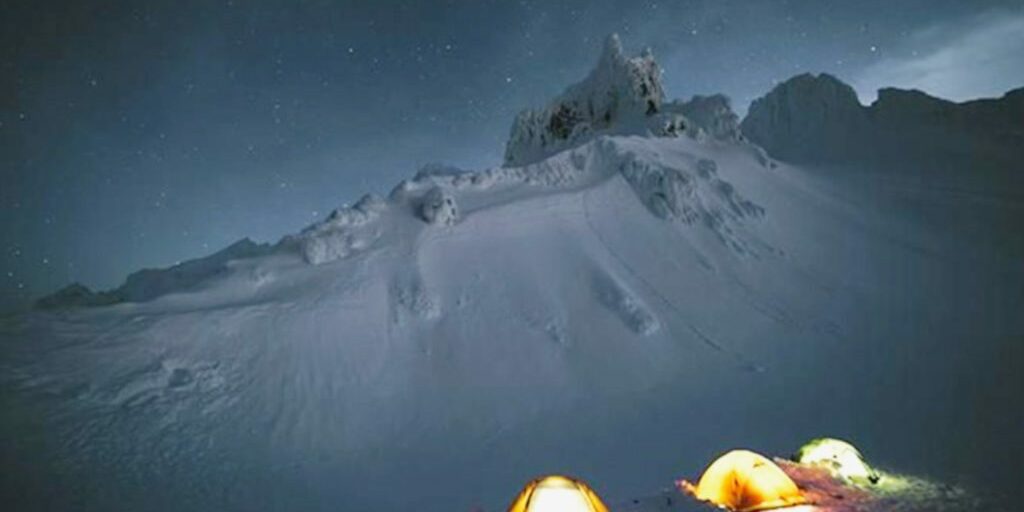On Keeping Warm
Welcome to this edition of Firelight, curated by Sara Wilhelm Garbers. Read on for her meditation on the beloved Mary Oliver poem “Wild Geese”, an invitation to care for ourselves well, to keep warm through the cold winter night.
This Month’s Curator
Sara Wilhelm Garbers teaches formation at United Seminary, is a doctoral candidate at Loyola University Chicago, and a feminist activist and pastor. She is writing her dissertation on a theological ethics of memory that centers on the experiences of survivors of sexual assault. You can follow Sara’s work online www.sarawg.com or on Twitter at @SaraWilhelmGarb.
On Keeping Warm Through the Night
by Sara Wilhelm Garbers
November 15, 2017

Credit: The CLYMB Blog
I’m in the midst of a significant life decision, and in the midst of my discernment and processing I’ve been brought face-to-face with the ways in which I was formed to believe that it is my job to carry people and systems—that I must do this so that the things and the world I believe in will come to fruition. And while there are parts of this internalization that I intend to carry with me long into the future (for I believe we are all, indeed, a part of the earth and one another), there are other parts of this narrative and identity that I seek to breathe life into so that I might release and let go of with compassion and self-love the ways in which I believe that I am responsible for saving (or destroying) the things and people I love.
What I mean by this wrestling is something like this quote: “You don’t have to set yourself on fire to keep someone else warm.”
For maybe, like me, things in this world have and continue to break your heart. And you carry people and this earth in your skin and in your soul.
And I find that at times in this work I am lured into believing that I can be a sacrifice for the cause of more love and justice in the world. But then…I am gently held and reminded by a quiet voice that it is through love that the world is changed, not through fire, and certainly not through the sacrifice of myself will the long arc of goodness find life and breath.
No, instead the way to keep one another warm is through the radiance of our own heat and beauty and skin as we hold one another. For both you and I are needed to survive the long night. Through our words, our presence, and our collective warmth, we will keep one another awake; we will keep watch while the other finds needed sleep…and together we will awaken to a new morning.
“You don’t have to set yourself on fire to keep someone else warm.” Yes.
Last week as I spoke with my therapist, through tears, reflecting on community that has shaped and formed me, at a loss to know how to voice the truth my soul knew already: that I wanted and needed to make a choice to care for myself. As I wrestled with my knowing, she spoke to
me the worlds of reminder from the poem “Wild Geese” by Mary Oliver: “You do not have to be good/You do not have to walk on your knees/For a hundred miles through the desert, repenting.”
“You do not have to be good.”
How many of us were formed to be the “good ones”? The kids who cared for a family in chaos; the ones who awakened to the urgency of our climate….and believed that we carried the weight of the “saving” on our shoulders and our skin (of course most of us would be loath to admit this because we all know the importance and value of solidarity)? How many of us believed we had to be good?
And how many of us have lived our lives as a perpetual act of repentance, or in some ways this work becomes the place to exorcise the demons that haunt us? What if we are found out? What if we are tried and found lacking? And so we radicalize more and push ourselves to the brink in service of that in which we believe.
I wonder… what if… what if we forgave ourselves?
What if we turned towards love? Even loving ourselves?
What if we remembered the words of Audre Lorde when she writes…
What if we do not haveto walk “for a hundred miles through the desert, repenting”?
What of if instead we headed this invitation: “You only have to let the soft animal of your body love what it loves.”
Love. In my community of faith we sing a song that goes like this: “We believe that love can change the world. It’s the only thing that can it’s the only thing that will.”
And what if that love holds even us? What if it starts there? What if: “You do not have to set yourself on fire to keep others warm”?
“You only have to let the soft animal of your body love what it loves.”
I went home and read and re-read the whole poem “Wild Geese.” I made it my cover photo on FaceBook. I shared it with three friends who were all holding similar questions and were slogging through the mud. And through tears and conversation, we shared in each other’s warmth and reminded each other:

Image by Liz West.
You do not have to be good.
You do not have to walk on your knees
For a hundred miles through the desert, repenting.
You only have to let the soft animal of your body
love what it loves.
Tell me about despair, yours, and I will tell you mine.Meanwhile the world goes on.
Meanwhile the sun and the clear pebbles of the rain
are moving across the landscapes,
over the prairies and the deep trees,
the mountains and the rivers.
Meanwhile the wild geese, high in the clean blue air,
are heading home again.Whoever you are, no matter how lonely,
the world offers itself to your imagination,
calls to you like the wild geese, harsh and exciting —
over and over announcing your place
in the family of things.
You are seen. You are loved.
And may this love that holds us all sustain you like the wild goose that you are. May you love your “soft animal body”. May we be a people who “tell each other of our despair”.
And may the warmth of our bodies and our words keep each other warm through the night. Take good care, my friends, for you…alive and flying high…you are what is needed to sustain the work of life in our world.
With gratitude and in hope, Sara WG



